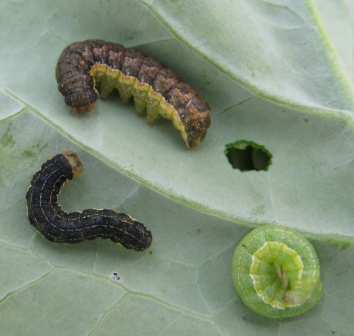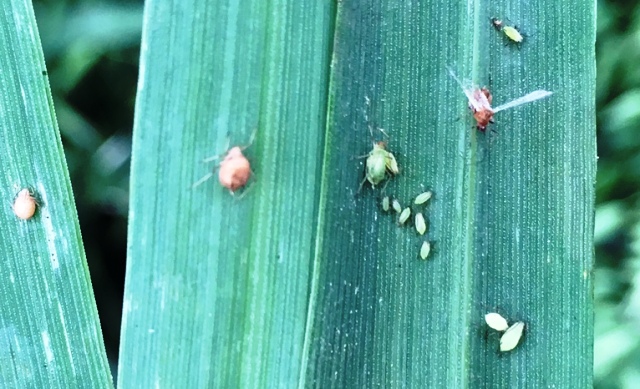Manitoba Insect and Disease Update: Week of August 6, 2013
Bertha Armyworm on Canola: Populations of bertha armyworms around economic threshold have been reported from a couple of fields in the Dominion City area. Some populations in the Southwest and Somerset areas are also being watched to see if they approach economic threshold levels.
Note when monitoring for bertha armyworm that older stages of larvae can be either green, brown and black. The caterpillars in the photo below are all bertha armyworms.

If counts of larvae are above suggested economic thresholds, note that the leaf feeding the caterpillars are doing late in the season is not what is going to cause the economic damage. It is the feeding on the pods that can become economical. So the recommended timing of control, should levels be above economic threshold, would be just as pod feeding is starting to be noticed. Also note that the larvae are nocturnal, and can be well hidden during the day. So evening applications, as late as practical, are also preferred. Also pay attention to preharvest intervals, which is the amount of time from the application to swathing or straight cutting.
Preharvest intervals of insecticide for bertha armyworm in canola
| Insecticide | Preharvest Interval |
|---|---|
| Coragen | 1 |
| Decis | 7 |
| Matador / Silencer | 7 |
| Lannate | 8 |
| Monitor | 10 |
| Lorsban, Pyrinex, Nufos, Citadel | 21 |
| Ripcord, Up-Cyde | 30 |
Lygus bugs: High levels of Lygus bugs have not been reported in canola yet, with the exception of some canola fields in eastern Manitoba. A sweep net is necessary for monitoring Lygus bugs. They are difficult to assess in canola otherwise. Early pod formation is the most vulnerable stage to Lygus bugs. Once the seeds in the lower pods are hardening and are no longer green, then damage from Lygus bugs is not likely to be economical.
Insects on Sunflowers: Lygus bugs have been at economic levels in some fields of confection sunflowers. Seed weevils continue to be at very lower levels. It is good to be checking confection sunflowers for Lygus bugs, banded sunflower moth, and seed weevils when plants are in the very early flowering stages. It is unlikely economical populations of seed weevils will be found this year; please let me know if you are finding any as I would be curious if anyone is encountering them. Lygus bugs are the more likely insect to be of concern in some fields, but may not be present at economic levels in all fields. Lygus bugs are not a concern for growers of oilseed sunflowers that will be used for oil, but can be of concern in confection sunflowers or oilseed sunflowers marketed for baking. If a sunflower field does need to be sprayed for Lygus bugs, the timing of the application, both stage of plant and time of day, is important to help maximize yield and quality. Treatment in the R4 to R5.1 stage is the recommended stage to treat if populations are above the economic threshold. Also consider that in flowering sunflowers there will be pollinators, which are also helping improve yield of the sunflowers, as well as providing a livelihood for beekeepers. The only insecticide registered for Lygus bugs in sunflowers is Matador, which can not be applied to flowering crops when bees are visiting the treated area. So once again, if treatment is necessary spraying as late in the day as practical is preferred.
Insect Identification Quiz
On many crops you will occasionally see these "insects". They may look like aphids, but are not green or yellow, as many of our crop feeding aphids are. On close examination, some seem to have holes in them. What are they?

These are known as aphid mummies. They are the remains of aphids that have been killed by parasitoids. Whereas predators will consume the aphid, parasitoids live inside the aphid and develop, then emerge as an adult leaving behind these swollen and hardened remains of the aphid.
Compiled by:
- John Gavloski, Entomologist
Manitoba Agriculture, Food and Rural Initiatives
Phone: (204) 745-5668
Fax: (204) 745-5690. - Holly Derksen, Plant Pathologist
Manitoba Agriculture, Food and Rural Initiatives
Phone: (204) 750-4248
Fax: (204) 745-5690
To report observations on insects or plant pathogens that may be of interest or importance to farmers and agronomists in Manitoba, please send messages to the above contact address.
To be placed on an E-mail list so you will be notified immediately when new Manitoba Insect and Disease Updates are posted, please contact John Gavloski at the address or numbers listed above.
